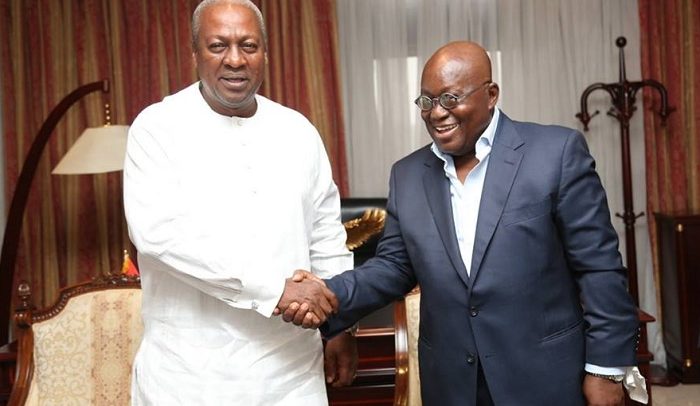President Akufo-Addo (right) and John mahama
President Akufo-Addo has touted his administration’s record on single-digit inflation and other macroeconomic stability to indicate that an election victory by his predecessor and National Democratic Congress (NDC) opponent, John Dramani Mahama, would mean economic doom for the nation.
According to him, his government has contained inflation by reducing from 15% inherited from the Mahama era in 2017 to 7.9% to provide the sound environment underpinning economic diversification and transformation process.
The President made the remarks last Friday during the inauguration of the newly reconstituted 13-member board for the Bank of Ghana.
“As I intimated earlier, my government inherited, in 2017, an economy riddled with macroeconomic imbalances and a financial sector that was at the tipping point of collapse but dressed up in camouflage by unsustainable daily support from the central bank,” he stated.
He continued, “We had to introduce, immediately, reforms and corrective measures to address the imbalances and restore stability.”
“Very quickly, with the support of the Bank of Ghana, macroeconomic stability was restored, which provided a sound environment to underpin the government’s economic diversification and transformation process,” he stressed.
The President noted, “Today there is clear evidence that inflation has been well-contained” and added that in 2017 he was inaugurating the previous board of the central bank “inflation was some 12% down from the 15% inherited from the Mahama era.”
“And four years down the line, inflation has been well-managed and has dropped to as low as 8% at the end of the second quarter of the year. Inflation is currently at 7.9% at the end of July 2021 within the target band of the Bank of Ghana,” he asserted.
President Akufo-Addo said he was encouraged by the many corporate governance measures that had been put in place by the central bank to mitigate future bank failures and guarantee “a strong banking sector” that can drive the transformation agenda of the government.
He praised officials of Bank of Ghana for “commendable” policy measures which are aligned with “the overall objective of moving Ghana to a situation beyond aid.”
Banking clean-up
The President said the financial sector challenges were probably the “most difficult problem” his government encountered coming into office in 2017, noting that “many of our banks were in distress and have been kept on unsustainable and artificial life support by the central bank.”
President Akufo-Addo stated that the supervisory agencies were not performing their duties and this allowed “weak governance and management structures of many banks to fester.”
“We were in a desperate situation and urgent, radical measures had to be taken to prevent the collapse of the entire financial and banking sector with consequences too dire to contemplate,” he argued.
According to him, the Bank of Ghana, under a new leadership, intervened and restored sanity to the sector, and in the process, saved the banks involved and the funds of some 4.6 million depositors.
The President indicated that his government found some GHc 21 billion to fund the clean-up exercise that enabled the financial and banking services sector to be robust again and better to finance the “rapid development of our nation.”
“A few days ago, the World Bank Country Director for Ghana, Liberia and Sierra Leone, had this to say about the banking sector clean-up: ‘It was important that this clean-up happened. Maybe the details could have been done differently.”
“I won’t get into that but under direction and what happened, it was important because you cannot have a financial sector that is plagued by non-performing banks, non-performing loans, institutions that have poor governance, institutions that cannot honour people’s desire to have their funds back.”
By Ernest Kofi Adu


